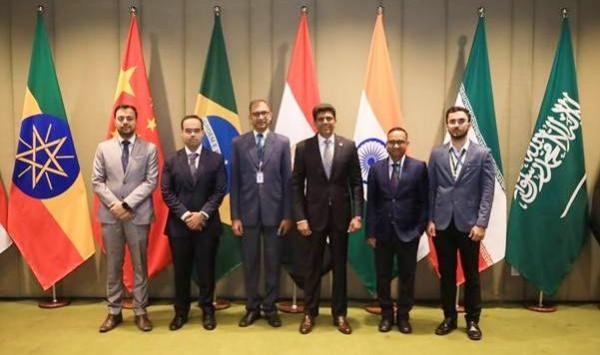
India has taken a significant step towards enhancing international digital cooperation by reaffirming its commitment to building an inclusive, sustainable, and future-ready digital ecosystem. This commitment was highlighted during the 11th BRICS Communications Ministers' Meeting held in Brasilia, Brazil, on June 3, 2025. The meeting brought together representatives from the BRICS nations—Brazil, Russia, India, China, South Africa, and other member countries—to discuss advancements in digital public infrastructure and the potential for deeper collaboration among member states.
Union Minister of State for Communications, Pemmasani Chandra Sekhar, represented India at the meeting. He presented India's Digital Public Infrastructure (DPI) as a global benchmark for inclusive and transformative digital governance. Chandra Sekhar emphasized the pivotal role of flagship initiatives such as Aadhaar and the Unified Payments Interface (UPI) in advancing universal and meaningful connectivity.
Aadhaar, a unique digital identity system, has empowered over 950 million Indian citizens, facilitating seamless access to essential public and private services. Meanwhile, UPI has revolutionized real-time digital payments, now accounting for 46 percent of global digital transactions.
Chandra Sekhar underscored the importance of India's DPI model, which is built on open, interoperable platforms. This model serves as a catalyst for financial inclusion, good governance, and digital innovation while safeguarding against monopolistic practices. He called upon BRICS nations to deepen collaboration in harnessing digital public infrastructure to drive inclusive growth and build resilient digital economies.
![In picture: The fingerprints of an individual are being recorded for Aadhaar enrolment. [Representational image] Aadhaar](https://data1.ibtimes.co.in/en/full/655485/aadhaar.jpg?h=450&l=50&t=40)
India's digital progress and initiatives
During the meeting, Chandra Sekhar shared India's progress on four key pillars: Universal and Meaningful Connectivity, Space and Environmental Sustainability, and Digital Ecosystems. Under the visionary leadership of Prime Minister Narendra Modi, India has made significant strides in these areas. The country's vibrant startup ecosystem, robust digital skills initiatives, and progressive legislation, such as the Telecommunications Act and the Data Protection Act, have been instrumental in fostering trust and user safety in the digital age.
India's Sanchar Saathi initiative, a key effort to combat telecom fraud, was also highlighted. Chandra Sekhar called for enhanced BRICS cooperation in cybersecurity, data protection, and digital trust to ensure the safety and integrity of interconnected digital societies. The initiative aims to protect consumers and businesses from fraudulent activities, thereby strengthening the overall digital ecosystem.
India's digital journey has been marked by a remarkable transition from a digital divide to digital leadership. The ambitious Digital Bharat Nidhi programme has been a cornerstone initiative, funding landmark projects such as BharatNet, which now connects over 218,000 village councils with optical fiber infrastructure. India's indigenous development and mass deployment of 4G and 5G technologies have enabled near-universal high-speed connectivity, covering over 95 percent of the population with 4G and more than 80 percent with 5G. The country has also emerged as a global leader in affordable digital access, offering the lowest data rates worldwide at just 12 cents per gigabyte.
Bilateral talks and future prospects
On the sidelines of the BRICS meeting, Chandra Sekhar held productive bilateral talks with his Brazilian counterpart. The discussions focused on strengthening digital ties for a smarter, secure future. Topics included India's strides in indigenous 4G/5G development, domestic manufacturing, and potential cooperation in 6G, Quantum Tech, and Satcom. The talks also covered Brazil's 6GHz trials, satcom needs, telecom security, and global DPI cooperation.
Chandra Sekhar expressed optimism about the collaborative spirit among BRICS nations and acknowledged the expanded membership's role in enriching the dialogue. He commended the adoption of the Final Declaration, which reflects the collective commitment to advancing digital cooperation. The declaration is seen as a significant step towards achieving a unified approach to digital challenges and opportunities.

















